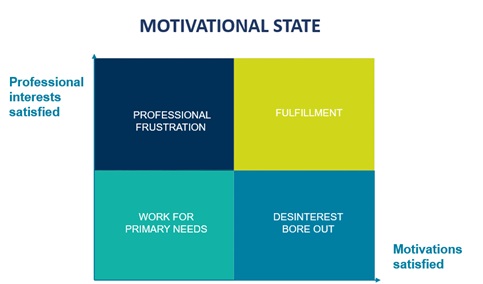The good way to find out what your ideal job is
Are you tired to waste your time on the internet looking for and taking tests, which eventually do not help you to build a study plan or find your ideal job? Do you need viable tools that will genuinely help you investigating and making decisions? If yes, I invite you to read the below article.
You must be wondering how to answer those questions, wherever you stand building your future: high school, college, university or working for your first employer. Some people already know from childhood what they are made for or passionate about. They will only need to think through practical information, such as the type of school they want to apply to, the budget they will need, where they want to be located or how long their studies shall last.
Before you look for answers to those specific questions, you may wonder: how do I pick the right career for myself? How do I choose a job that could both enrich and pay me off? Let me explore this with you via some tips and tools which could guide you and make you start to think the right way:
Before talking about a career, it is important to assimilate that it all starts with YOU. Who are you? Let’s explore yourself first! Getting to know yourself needs to be totally open to possibilities and you need to get rid of your own constraints and limits, or those set by your environment.

Basically, let’s grab a magic stick and ask yourself: What kind of person would I like to be in the job of my dream? Who would I be if anything was possible, if there were no restrictions at all?
It is the funnel theory: you start with an open bar of options, and once done, you them narrow down to 2 to 3 career plans, which are representative and consistent both with who you are and what is feasible on the work market.

How would you know what to do if you are not able to put words on your tastes, needs, core values, professional interests, motivations?
Exploring your own self will enable you to better identify professional areas that are compliant with your personality. As a result of facts, you will be able to target an education and then a company and position that will be closer to your preferences and skills. How will it feel to get a meaningful work, which will inspire you and make you wake up eager to engage? Isn’t this the perfect combo to naturally feel and be efficient and to make it more likely for you to progress and be recognised for your achievements? Close your eyes and picture it out. How does it make you feel?
Moreover, you may save time, energy and money because you may avoid making the wrong choices in the beginning and then have to reconsider it all at your 30’s or 40’s.
Some recent investigations show that millennials will probably change jobs 4 to 5 times before 32 years old (CNN, LinkedIn 04.12.2016). It is also a fact that motivations and professional interests vary along with time. This makes it even more obvious to learn to know yourself from the start. Because if you need to change job one day, you will probably feel better off being clear about who you are rather than feeling bad somewhere you don’t belong. It will also prevent you from taking a job only to fulfil your primary needs (namely to eat, have a place to live, social interactions…). This is something young adults often do in the beginning, unfortunately.
« When Eileen was in high school, she had no idea what she would do later. She knew she was good at foreign languages and maths. Not enough to study physics though. She took things as they came when she had to choose her next steps. After high school, she decided to study abroad, where she graduated in international management. When back in her home country, she accepted a position as a project manager although she did not necessarily plan to. She then grew and worked as a project manager until she was 38. When she gave birth to her second child, she started to feel her job was becoming more and more meaningless to her. She decided a career coaching would be beneficial. Thanks to the coaching, she understood she wanted to become an organizational psychologist. Could have she found that out sooner? »
How did the career coaching help Eileen to make up her mind? First of all, it was a custom-based approach, close to her needs and individuality. The professional coach gave her space and time to really think for herself and be authentically listened to, in a kind atmosphere. Then, thanks to powerful tools and open questions, she was able to take a step further and structure, organize, and plan an appropriate career. Coaching helps us to think deeper and quicker and find answers we wouldn’t necessarily think of on our own. Finally, she grew her self-confidence and her energy to fulfill her career plan. She trusted better her own choices for her next steps: education, school, traineeships, financial aspects, and so on.
Ok, now let’s try to turn theory into practice. Please grab a pen and some paper. Find a peace place to be and take time to think through and feel your emotions. Draw 2 columns on a worksheet: 1 for professional interests and 1 for motivational satisfaction. Let’s fill this out!

Professional interests are the professional fields people are interested in. For example: are you keen on working with figures, or with people? Do you need to use your hands or to work outside? Do you enjoy communication or data analysis or taking care of animals?…
Motivation satisfaction means to what extent the person is satisfied with what is important to them. What do you need to feel good at work? For instance: would you rather work in an open space or have your own office? Do you need to have nice peers you can hang around with, to travel abroad, to be autonomous, to have flexible hours? Do you like to feel useful, or to work in a big company, or to protect the environment?…
Once you are finished with filling out the columns, highlight the 3-5 items in both columns that you find are crucial for you to take into account in your career project. Those items will become your non-negotiable selection criteria. Let’s take 5 minutes so that you can process this exercise.
How do you feel now? What did you learn about yourself and your situation? I now invite you to read the next section.
When you combine professional interests and motivation satisfaction, you talk about motivational state. Motivational state is the energy you have to do things. It is essential to be aware of this and to follow it up during your whole career. It is indeed a very good tool to pinpoint what you need at work, both in terms of function and environment. This exercise comes from a tool called MOTIVA®. I use it a lot for career coaching as it analyses and put simple words on your motivations and professional fields that are the closest to your wanted motivational state.

The book describing Motiva’s theory was published in December 2015 by its founders Prof. Zwi Segal & Yves Duron: « La motivation, une compétence qui se développe : Guide pour développer la motivation et l’engagement au travail »
Once you have identified your list of key conditions to fulfil in your future job (professional interests and motivations), I invite you to build a search table. You can use it to rank the jobs and fields you are the most attracted to and use your key selection criteria defined earlier. It is an additional filter which will lead you to the end of the funnel (remember the funnel?). Now let’s do it and please listen to yourself carefully.

How do you feel now you have read the complete article and run the exercises? Do you feel any difference?
Do not hesitate to contact a career and study coach, by using our contact form, who will accompany you, ask you the right questions and guide you through the great adventure of discovering your future career path!

